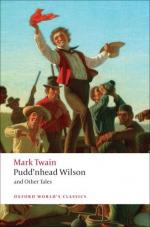“And in the meantime, while you are running on with your jokes, the money is still here, and it is fast getting along toward burglar-time.”
“True. Very well, what shall we do—make the inquiry private? No, not that; it would spoil the romance. The public method is better. Think what a noise it will make! And it will make all the other towns jealous; for no stranger would trust such a thing to any town but Hadleyburg, and they know it. It’s a great card for us. I must get to the printing-office now, or I shall be too late.”
“But stop—stop—don’t leave me here alone with it, Edward!”
But he was gone. For only a little while, however. Not far from his own house he met the editor—proprietor of the paper, and gave him the document, and said “Here is a good thing for you, Cox—put it in.”
“It may be too late, Mr. Richards, but I’ll see.”
At home again, he and his wife sat down to talk the charming mystery over; they were in no condition for sleep. The first question was, Who could the citizen have been who gave the stranger the twenty dollars? It seemed a simple one; both answered it in the same breath—
“Barclay Goodson.”
“Yes,” said Richards, “he could have done it, and it would have been like him, but there’s not another in the town.”
“Everybody will grant that, Edward—grant it privately, anyway. For six months, now, the village has been its own proper self once more—honest, narrow, self-righteous, and stingy.”
“It is what he always called it, to the day of his death—said it right out publicly, too.”
“Yes, and he was hated for it.”
“Oh, of course; but he didn’t care. I reckon he was the best-hated man among us, except the Reverend Burgess.”
“Well, Burgess deserves it—he will never get another congregation here. Mean as the town is, it knows how to estimate him. Edward, doesn’t it seem odd that the stranger should appoint Burgess to deliver the money?”
“Well, yes—it does. That is—that is—”
“Why so much that-is-ing? Would you select him?”
“Mary, maybe the stranger knows him better than this village does.”
“Much that would help Burgess!”
The husband seemed perplexed for an answer; the wife kept a steady eye upon him, and waited. Finally Richards said, with the hesitancy of one who is making a statement which is likely to encounter doubt,
“Mary, Burgess is not a bad man.”
His wife was certainly surprised.
“Nonsense!” she exclaimed.
“He is not a bad man. I know. The whole of his unpopularity had its foundation in that one thing—the thing that made so much noise.”
“That ‘one thing,’ indeed! As if that ‘one thing’ wasn’t enough, all by itself.”
“Plenty. Plenty. Only he wasn’t guilty of it.”
“How you talk! Not guilty of it! Everybody knows he was guilty.”




